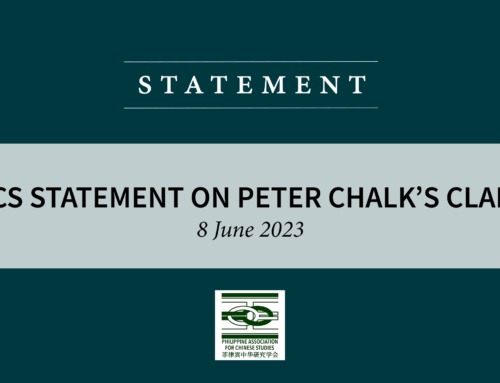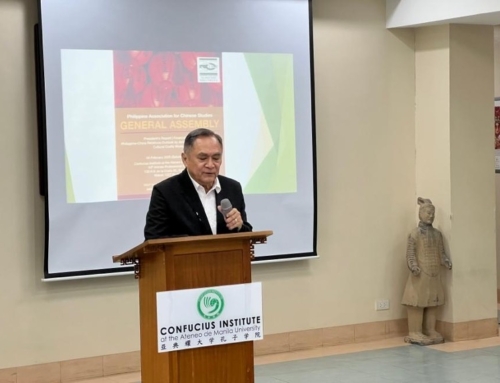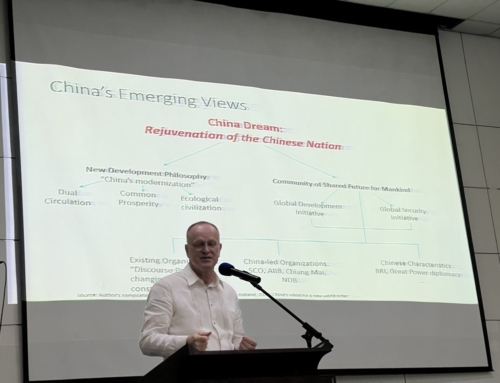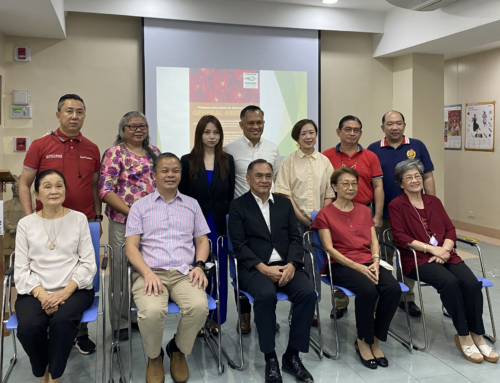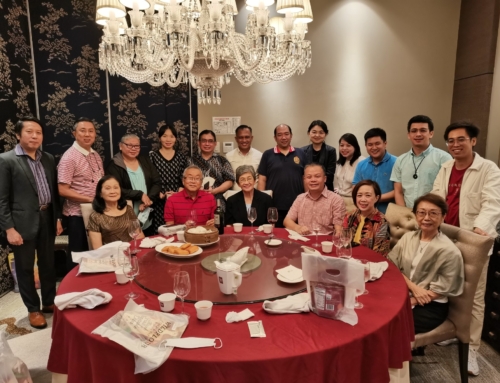Skip to content
PACS WEBINAR: Philippines-China Relations During COVID-19
By Theresa Cariño*
The Philippine Association for Chinese Studies and the Philippine Studies Center of Jinan University co-hosted a webinar on “Philippines-China Relations During COVID-19” on Monday, July 27th, 2020, 9.00 A.M. – 12.00 P.M.
In his opening remarks, Dr. Rommel Banlaoi, PACS President, briefly introduced the Association, explaining that the webinar was part of the year-long celebration of the 45th anniversary of Philippines-China diplomatic ties. Prof Dai Fan, Director of the Philippine Studies Center (PSC) at Jinan University, expressed his appreciation for the growing collaboration between the center and PACS and anticipated the success of the new series of joint webinars.
Established in 2016, the PSC is an area study base, a think tank, and public policy advocate that promotes a better understanding of the Philippines in China. Prof Zhang Zhengjian, Dean of International Studies at Jinan University noted in his remarks that while 45 years of diplomatic ties is not a very long time, there were substantial issues to be addressed.
Chinese Ambassador to the Philippines, Huang Xilian, highlighted in his keynote speech the need for closer cooperation given that the COVID-19 pandemic has become a global crisis threatening people’s health and lives and plunging the global economy into a deep recession. In such a context, the important consensus reached in 2018 between President Xi Jinping and President Duterte on comprehensive strategic cooperation was important: such as setting aside maritime disputes, managing the situation through bilateral consultations, and enhancing dialogue and cooperation. These will have to be vigorously implemented through the Bilateral Consultation Mechanism (BCM) and advancing the consultation on the Code of Conduct (COC) in the South China Sea. He stressed that the South China Sea issue is not the sum total of China-Philippines relations and called on the Philippines not to allow external powers “to roil the waters in the South China Sea” nor waver in its commitment to pursue an independent foreign policy and China-Philippines friendly relations.
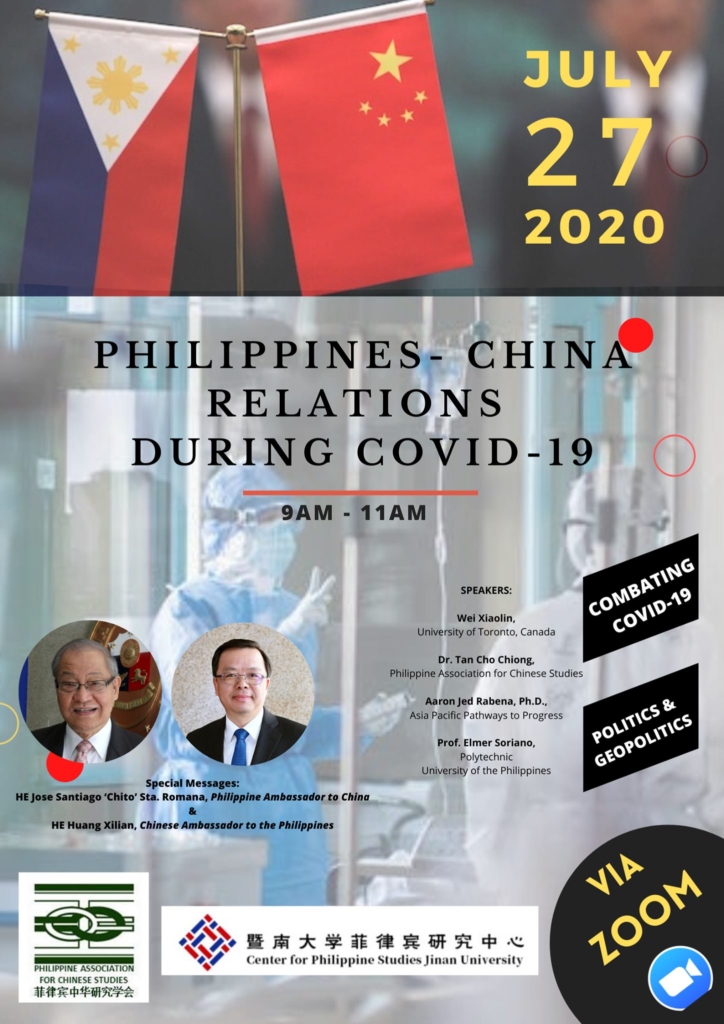 China will continue to work with the Philippines on COVID-19 prevention and control, stepping up efforts for the establishment of a “fast lane” for urgently needed personnel exchanges and a “green corridor” for logistics. Huang proposed seizing new opportunities to strengthen digital economic cooperation areas such as 5G, big data, and artificial intelligence to foster new growth drivers for bilateral cooperation.
China will continue to work with the Philippines on COVID-19 prevention and control, stepping up efforts for the establishment of a “fast lane” for urgently needed personnel exchanges and a “green corridor” for logistics. Huang proposed seizing new opportunities to strengthen digital economic cooperation areas such as 5G, big data, and artificial intelligence to foster new growth drivers for bilateral cooperation.
In his keynote address, Philippines Ambassador to China, Chito Sta. Romana reminded participants of the long history of Filipino-Chinese ties over the centuries. The current pandemic has slackened the pace of bilateral cooperation but opened a new dimension in China-Philippines relations. The Philippines, was among the first to send medical aid to the Chinese people, especially those in Wuhan. There were also more than 50 Philippines Air Force flights that flew over the South China Sea to Xiamen, Quanzhou, Changsha, Shenzhen, and Shanghai to pick up medical equipment and supplies for the Philippines. This level of cooperation should continue, given the new spike in COVID-19 infections after the partial reopening of the economy.
Sta. Romana also enumerated the significant growth in ties between the two countries in tourism, trade, and investments as well as in development cooperation especially since the elevation of relations to comprehensive strategic cooperation in 2018. There should be constructive engagement on all issues including areas where there is no common agreement. Sta. Romana was confident that economic and development partnerships will continue to grow despite COVID-19.
Dr. Wei Xiaolin, a medical expert and public health researcher at Toronto University spoke on “Lessons learned from China’s Response to the COVID-19 pandemic.” He compared Canada and China in five areas (1) public health capacity (2) political commitment (3) health system strategies (4) community engagement and (5) global health collaboration. China scored high in all areas. Its public health capacity included a fairly high number of hospital beds, widespread health insurance coverage, an effective internet reporting system, and high levels of research. Its willingness to impose an unprecedented lockdown and mobilize 42,600 doctors and health workers nationwide were impressive. It implemented health system strategies for containment and suppression of the spread in other areas, in response to re-opening and second wave prevention. There were also strong levels of community engagement that showed discipline, coordination, and cooperation. At the global health level, China contributed funds to the WHO for pandemic response and shared its experiences despite the lack of transparency at the very early stage of the outbreak.
Dr. Tan Cho Chiong, PACS Board Director, a neurologist at the Metropolitan General Hospital and President of the Philippine Academy on Acupuncture, spoke on “Chinese-Filipino Contributions during COVID-19”, highlighting the contributions of the private sector and NGOs. Substantial financial contributions of over 300 million pesos from Chinese Filipinos were channeled through major organizations such as the Federation of Filipino-Chinese Chambers of Commerce and Industry, World News, and Kaisa. These were donated to UPPGH, TOWNS, and other centers/organizations for further distribution to 181 hospitals and 584 barangays throughout the nation. There were also contributions in kind such as food, medicines, and PPEs to marginalized local communities. As many Chinese-Filipinos prefer to remain “anonymous” donors, their contributions are difficult to fully quantify. Since the pandemic severely affected mental health closely linked to unemployment, poverty, and suicides, hospitals run by Chinese-Filipinos also served individuals and communities through tele-consultations and counseling. Neighborhoods were given support in starting vegetable gardens to promote food sufficiency and alleviate poverty.
Dr. Jed Rabena, Research Fellow at APPFI spoke on the “Politics and Geopolitics of Sino-Philippines Relations under COVID-19”. He listed China’s numerous contributions of masks and medical supplies (worth P14 million) through the Chinese military and also from the Chinese corporate sector to help in the Philippines’ fight against COVID-19. Chinese companies from TikTok and Vivo to the BOC and Online ESL have donated millions but despite these substantive contributions, Filipino perceptions of China remained at a historic low. Rabena identified the following reasons for these: China’s association with cheap and low-quality goods, illegal drugs, some of the criminal activities of Philippine Offshore gambling operators, and misbehaving Chinese nationals. These negative images had been exacerbated by the disputes over conflicting claims in the South China Sea, and the “debt trap and China threat” narratives in international media coverage which have been amplified in local, social media. China could mitigate some of these negative impressions by fast-tracking the negotiations and implementation of investment pledges made by President Xi to President Duterte. President Duterte also needs to moderate his excessive praise for China while China has to improve its PR strategy in the Philippines and take into account the implications of its actions in the South China Sea.
Prof. Elmer Soriano, Chairman of PUP Political Science Department presented results of a “Survey on Filipino Perceptions of COVID-19” jointly conducted with Jinan University’s Philippine Studies Center. The recently held survey sought to identify sources of information on COVID-19 (whether Chinese or English), the impact the pandemic had on respondents’ lives, and their ranking of countries based on their performance in combatting the virus. 96% of the 450 respondents had tertiary education and were mostly professionals and college students. The majority sourced information on COVID-19 through international English media such as CNN, social media, and Filipino outlets. Only a small minority sourced information from English language Chinese sources such as China Daily or Wechat. US performance in combatting COVID-19 was negatively perceived. Countries deemed to have performed well included Japan (50%) and China (39%). Respondents anticipated that the most rapid recovery would take place in Japan followed by Singapore, then China. In general, respondents ranked China’s performance positively and think that it will be the fastest in developing a vaccine, followed closely by Japan. 66% of respondents expressed awareness of China’s contributions in combatting COVID-19.
In his closing remarks, Fr. Aristotle Dy, Vice-President of PACS noted that given the lengthy history of China-Philippines relations it was refreshing to hear that the relationship cannot be reduced simply to the territorial dispute, even if there have been moves in this area during the pandemic. The lecture by Dr. Wei Xiao Lin pointing to salient aspects of the health system in combatting COVID-19 provided important lessons for the Philippines. Dr. Tan Cho Chiong highlighted the impressive role of the private sector and civic action groups in the Philippines in containing the spread of the virus, notably the many contributions from the Chinese-Filipino community. Dr. Jed Rabena gave an overview of China’s contributions to the Philippine response to Covid-19, which he aptly called facemask diplomacy. These efforts came from the government, the military, and the private sector. And yet, negative perceptions of China have persisted in the Philippines due to the POGOs, the misbehavior of some Chinese nationals in the Philippines, the actions of the Chinese government in the territorial dispute. Despite all this, the results of a survey undertaken by Prof. Elmer Soriano indicated that the overall perception of China was positive among the respondents. Dy concluded that it was most important for Filipinos to be pro-Philippines, rather than be pro or anti-China or pro or anti-US. He stressed that “It would be necessary to temper the rhetoric on all sides and focus instead at concrete avenues of collaboration, to see how these can grow and benefit our people.
*Dr. Theresa Cariño is the founding President of PACS where she currently sits as a member of the Board of Directors.
PACS2020-08-04T11:12:46+00:00
Share This Story, Choose Your Platform!
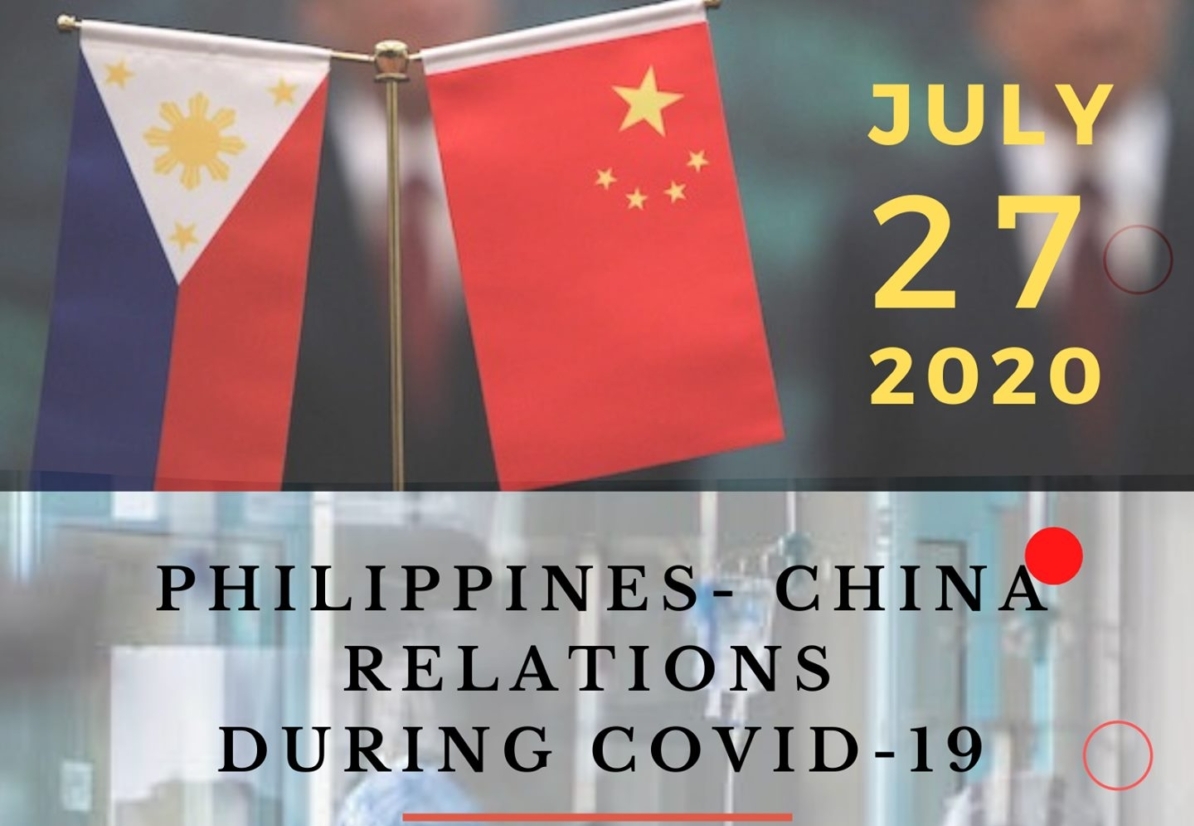
 China will continue to work with the Philippines on COVID-19 prevention and control, stepping up efforts for the establishment of a “fast lane” for urgently needed personnel exchanges and a “green corridor” for logistics. Huang proposed seizing new opportunities to strengthen digital economic cooperation areas such as 5G, big data, and artificial intelligence to foster new growth drivers for bilateral cooperation.
China will continue to work with the Philippines on COVID-19 prevention and control, stepping up efforts for the establishment of a “fast lane” for urgently needed personnel exchanges and a “green corridor” for logistics. Huang proposed seizing new opportunities to strengthen digital economic cooperation areas such as 5G, big data, and artificial intelligence to foster new growth drivers for bilateral cooperation.